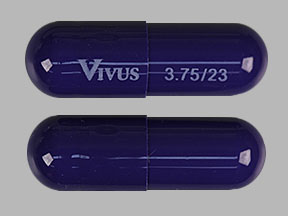Qsymia and Alcohol/Food Interactions
There are 3 alcohol/food/lifestyle interactions with Qsymia (phentermine / topiramate).
Phentermine Food/Lifestyle
Moderate Food Interaction
Consumer information for this interaction is not currently available.
GENERALLY AVOID: Alcohol may potentiate the central nervous system and cardiovascular effects of centrally-acting appetite suppressants. In one study, concurrent administration of methamphetamine (30 mg intravenously) and ethanol (1 gm/kg orally over 30 minutes) increased heart rate by 24 beats/minute compared to methamphetamine alone. This increases cardiac work and myocardial oxygen consumption, which may lead to more adverse cardiovascular effects than either agent alone. Subjective effects of ethanol were diminished in the eight study subjects, but those of methamphetamine were not affected. The pharmacokinetics of methamphetamine were also unaffected except for a decrease in the apparent volume of distribution at steady state.
MANAGEMENT: Concomitant use of centrally-acting appetite suppressants and alcohol should be avoided if possible, especially in patients with a history of cardiovascular disease. Patients should be counselled to avoid hazardous activities requiring complete mental alertness and motor coordination until they know how these agents affect them, and to notify their physician if they experience excessive or prolonged CNS effects that interfere with their normal activities.
Switch to professional interaction data
Phentermine High Blood Pressure (Hypertension)
Major Potential Hazard, Moderate plausibility
CNS stimulants - cardiac disease
Many CNS stimulants are contraindicated in patients with significant cardiovascular impairment such as uncompensated heart failure, severe coronary disease, severe hypertension (including that associated with hyperthyroidism or pheochromocytoma), cardiac structural abnormalities, serious arrhythmias, etc. Sudden death has been reported in patients with structural cardiac abnormalities or other serious cardiac disease who are treated with CNS stimulants at the recommended dosages for attention deficit hyperactivity disorder; use of these agents should be avoided in patients with known structural cardiac abnormalities, cardiomyopathy, serious cardiac arrhythmia, coronary artery disease, or other serious cardiac disease. Additionally, stroke, myocardial infarction, chest pain, syncope, arrhythmias, and other symptoms have been reported in adults under treatment. A careful assessment of the cardiovascular status should be done in patients being considered for treatment. This includes family history, physical exam, and further cardiac evaluation (EKG and echocardiogram). Patients who develop symptoms should have a detailed cardiac evaluation and if needed, treatment should be suspended.
Phentermine High Blood Pressure (Hypertension)
Major Potential Hazard, Moderate plausibility
CNS stimulants - hypertension
CNS stimulants increase blood pressure and heart rate; the use of some agents may be contraindicated in patients with severe/uncontrolled hypertension. Caution should be used when administering to patients with preexisting high blood pressure (even mild hypertension) and other cardiovascular conditions. All patients under treatment should be regularly monitored for potential tachycardia and hypertension.
Switch to professional interaction data
Qsymia drug interactions
There are 417 drug interactions with Qsymia (phentermine / topiramate).
Qsymia disease interactions
There are 21 disease interactions with Qsymia (phentermine / topiramate) which include:
- cardiovascular
- glaucoma
- oligohidrosis/hyperthermia
- agitation
- cardiac disease
- glaucoma
- hypertension
- psychiatric disorders
- pulmonary hypertension
- substance abuse
- suicidal tendency
- renal dysfunction
- metabolic acidosis
- renal dysfunction
- diabetics
- dialysis
- liver disease
- angle closure glaucoma
- hemodialysis
- liver disease
- nephrolithiasis
More about Qsymia (phentermine / topiramate)
- Qsymia consumer information
- Check interactions
- Compare alternatives
- Pricing & coupons
- Reviews (567)
- Drug images
- Side effects
- Dosage information
- During pregnancy
- Generic availability
- Support group
- FDA approval history
- Drug class: anorexiants
- En español
Related treatment guides
Drug Interaction Classification
| Highly clinically significant. Avoid combinations; the risk of the interaction outweighs the benefit. | |
| Moderately clinically significant. Usually avoid combinations; use it only under special circumstances. | |
| Minimally clinically significant. Minimize risk; assess risk and consider an alternative drug, take steps to circumvent the interaction risk and/or institute a monitoring plan. | |
| No interaction information available. |
See also:
Further information
Always consult your healthcare provider to ensure the information displayed on this page applies to your personal circumstances.


